This article was medically reviewed by Jonas DeMuro, MD. Dr. DeMuro is a board certified Pediatric Critical Care Surgeon in New York. He received his MD from Stony Brook University School of Medicine in 1996. He completed his fellowship in Surgical Critical Care at North Shore-Long Island Jewish Health System and was a previous American College of Surgeons (ACS) Fellow.
There are 10 references cited in this article, which can be found at the bottom of the page.
wikiHow marks an article as reader-approved once it receives enough positive feedback. In this case, several readers have written to tell us that this article was helpful to them, earning it our reader-approved status.
This article has been viewed 65,563 times.
Experts agree you need immediate medical treatment for a broken jaw since it can cause bleeding or even interfere with your breathing. A broken jaw occurs when you have a fracture in your jaw bone, often because of an injury.[1] Researchers say that if your jaw is broken, you'll likely have pain in your jaw or cheek, trouble chewing and opening your mouth, loose or missing teeth, and misaligned teeth.[2] While a broken jaw can feel scary, a doctor can set the break so your jaw heals properly and may give you treatment to manage your pain.
Steps
Managing Your Injury Before You Can See a Doctor
-
1Recognize the symptoms of a broken jaw. You may have injured your jaw by falling, getting in a car accident, being assaulted, or suffering from a sports or recreational injury. You will most definitely know if you have broken your jaw. If you think you may have broken your jaw, you may be experiencing some of the following symptoms:[3]
- A swollen or bruised face
- Problems opening your mouth wide or closing your mouth
- Loose or damaged teeth
- Numbness on your face, particularly in your lower lip area
- Jaw pain or tenderness that is worse when you bite or chew
- Bleeding from your mouth
- Pain in your face or jaw that gets worse when you move
- A lump or abnormal appearance of your cheek or jaw
- Upper and lower teeth do not match up when you bite down
-
2Stabilize your jaw. Hold your jaw in place with your hands or use a bandage. Wrap the bandage under your jaw and over the top of your head. Be careful not to wrap the bandage too tight. You may feel the urge to throw up because of your injury, so you need to be able to easily remove the bandage.[4]
- Keeping your jaw stabilized can prevent any further injury until you can get to the emergency room.
- If you do not have a bandage, try using a scarf, neck tie, or handkerchief.
Advertisement -
3Apply a cold compress. A cold compress can help reduce swelling. Keep the ice or cold compress on for 15 to 20 minutes at a time. If you are using ice, wrap the ice in a towel first to prevent frostbite.
- Lightly place the compress on your jaw. Too much pressure can cause more pain and damage.
- If you don't have an ice pack or compress, you can use a bag of frozen vegetables, like peas or corn.
Seeking Medical Treatment
-
1Go to the emergency room. If you break your jaw, get medical care as soon as you can. It is best to have your jaw examined at a large hospital so you have access to surgeons and specialists. The doctor will conduct a physical exam and possibly order X-rays.[5] Your doctor will want to rule out other injuries as well, such as damage to the cervical spine.[6]
- Because your jaw is broken, your tongue has lost support and you may have trouble breathing. If you are having any trouble breathing, call 911 immediately.
- Take along a plastic cup while you are in transit. This will be what you can spit saliva or blood into while you are on your way to see a professional.
- The doctor may also order a CT scan to evaluate your jaw.
-
2Have surgery performed on unstable fractures. A broken jaw may heal on its own or it may require surgery. If you have surgery, a doctor will wire your jaw to hold the jaw in place and allow the bones to heal. In some cases, screws and plates will be placed in your bones to heal your jaw.[7]
- If you have surgery, it may take one or two months to heal.
-
3Allow your minor fracture to heal. If your fracture is less severe, you will not need surgery. Your doctor may recommend eating a soft diet for 3 weeks and prescribe you pain medicine.[8] These fractures will heal on their own.[9]
- If your jaw was dislocated, the doctor will place it back into the correct position and bandage your jaw to stabilize it. You should avoid opening your mouth widely for at least 6 weeks if the doctor had to reset your jaw.
- If you feel pain when you yawn or sneeze, support your jaw with your hands.
-
4Take antibiotics. If your doctor thinks there is a high risk for an infection, antibiotics will be prescribed.[10] Follow your doctor's instructions for taking your antibiotics. Even if you feel better, continue to take the full course of your medicine.[11]
- Let your doctor know of any other medications you are taking. This can prevent any adverse drug reactions.
-
5Take pain medicine. Your doctor may give you a prescription pain medicine or advise you to take an over-the-counter pain medicine. Take the pain medicine as directed. If your do not get any relief from your pain medicine, contact your doctor. There may be an underlying issue that needs to be addressed.[12]
- Increased pain or swelling may indicate that you have an infection.
Living with a Broken Jaw
-
1Eat a soft diet. A soft diet minimizes any pain you may feel from chewing. Foods should be blended so you are able to sip them through a straw. Continue to eat a balanced diet. Even though you are not able to chew, your body still needs all of the same nutrients.[13]
- Remove skins, seeds, and peels before you blend them.
- Cook meat and vegetables before you blend them.
- You can add juice, broth, or gravy to thin out a mixture.
- Avoid blending foods with small seeds such as blackberries and strawberries.
- Don't blend raw eggs. Use powdered eggs instead.
- You can continue to eat many of the foods that you liked before. For example, if you like spaghetti and meatballs, prepare the dish and then put it in a blender.
-
2Adjust your diet if you are losing weight. You may be losing weight because of your soft diet. If this is the case, add extra calories to your food. Foods that you may add include:
- Powdered milk and protein powder
- Sweets such as honey, ice cream, molasses, or sugar
- Extra fats such as sour cream, cream cheese, nut butters, cream, and half-and-half.
-
3Brush your teeth after you eat. Brush your teeth with a soft bristle brush. Use your finger to pull out the cheek on the side that you are brushing. Then gently brush in a circular motion. In addition to brushing, rinse your mouth with warm salt water (1 teaspoon of salt in 8 oz of water).[14]
- A child sized toothbrush may work better until your jaw heals. The head of the brush is smaller, and it will be more comfortable than an adult toothbrush.
- Good oral care will prevent tooth decay, food buildup, and bad breath.[15]
- Your doctor may prescribe a special mouth rinse for you to use. Always follow your doctor's instructions if this is the case.
- Once you have finished brushing apply lip balm or Vaseline to prevent dry, cracked lips.
-
4Avoid activities that will hinder your healing. Do not smoke, drink alcohol or participate in any strenuous activities (e.g. running, contact sports, etc.) while your jaw is healing. Smoking will dry out and irritate your mouth and gums and slow healing. Alcohol can cause dehydration and nausea. Strenuous activities cause your jaw to move and will prolong the healing process.[16]
-
5Know when to contact your doctor. You may experience some complications during your healing process. It is important that these complications are handled quickly so you can continue heal properly. Pay attention to any changes that you experience. Reach out to your doctor as soon as possible if you experience any of these:[19]
- Trouble breathing, swallowing, or talking
- Red streaks in your jaw area
- A fever
- Pus draining from your jaw
- Your mouth is bleeding
- Your jaw does not seem to get any better
References
- ↑ https://medlineplus.gov/ency/article/000019.htm
- ↑ https://my.clevelandclinic.org/health/diseases/16025-facial-fractures
- ↑ https://www.nlm.nih.gov/medlineplus/ency/article/000019.htm
- ↑ https://www.nlm.nih.gov/medlineplus/ency/article/000019.htm
- ↑ https://my.clevelandclinic.org/health/diseases_conditions/hic-facial-fractures
- ↑ http://patient.info/doctor/mandibular-fractures-and-dislocations
- ↑ http://www.thechildren.com/health-info/trauma/broken-jaw
- ↑ http://www.thechildren.com/health-info/trauma/broken-jaw
- ↑ https://www.nlm.nih.gov/medlineplus/ency/article/000019.htm
- ↑ https://my.clevelandclinic.org/health/diseases_conditions/hic-facial-fractures
- ↑ https://myhealth.alberta.ca/Health/aftercareinformation/pages/conditions.aspx?hwid=uf8268
- ↑ https://myhealth.alberta.ca/Health/aftercareinformation/pages/conditions.aspx?hwid=uf8268
- ↑ http://www.oralfacialsurgeons.com/surgical-instructions/wired-jaw.asp
- ↑ http://www.med.umich.edu/1libr/Surgery/PlasticSurgeryPeds/PedsPlas-OrthognathicSurgery.pdf
- ↑ https://www.snorenet.com/surgical-instructions/fractured-jaw-surgery/
- ↑ http://www.med.umich.edu/1libr/Surgery/PlasticSurgeryPeds/PedsPlas-OrthognathicSurgery.pdf
- ↑ http://www.oralfacialsurgeons.com/surgical-instructions/wired-jaw.asp
- ↑ https://www.snorenet.com/surgical-instructions/fractured-jaw-surgery/
- ↑ https://myhealth.alberta.ca/Health/aftercareinformation/pages/conditions.aspx?hwid=uf8268
- ↑ http://patient.info/doctor/mandibular-fractures-and-dislocations
About This Article
To care for a broken jaw, it's important to get medical care as soon as the injury occurs in case you need surgery or antibiotics. Once you're back at home, you can take prescription or over-the-counter pain medication to manage the discomfort and swelling you're experiencing. Eat a soft diet consisting of blended foods that you can sip through a straw, since you can't chew. Also, be sure to avoid cigarettes, alcohol, and strenuous activities, like running or contact sports, while your jaw is healing. For tips on recognizing complications during your recovery that might require medical intervention, read on!

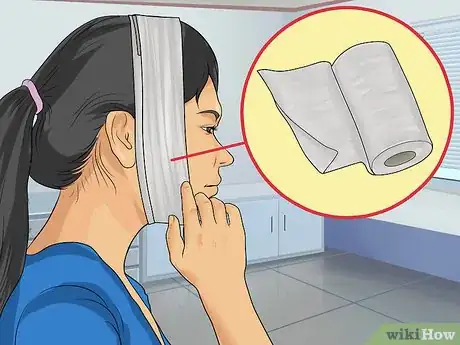
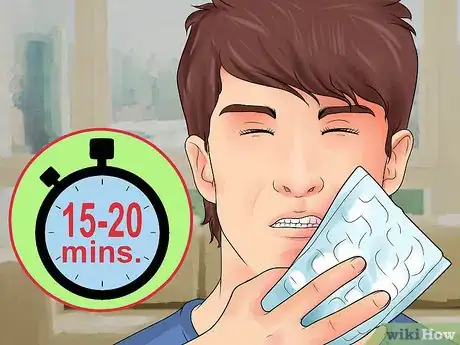

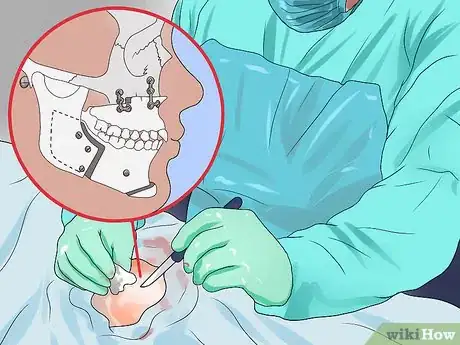
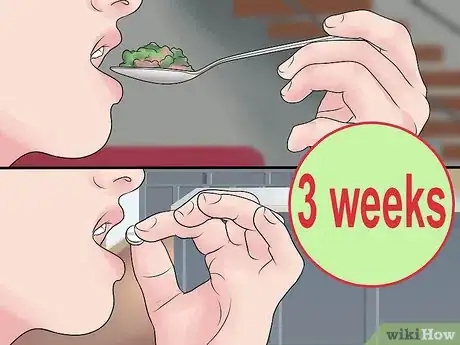
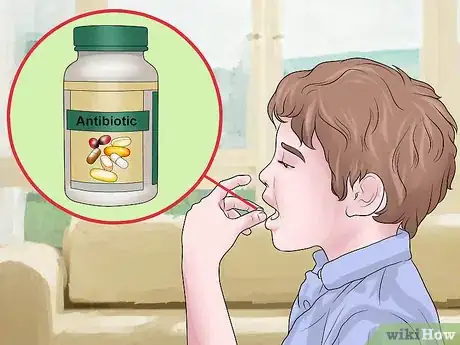
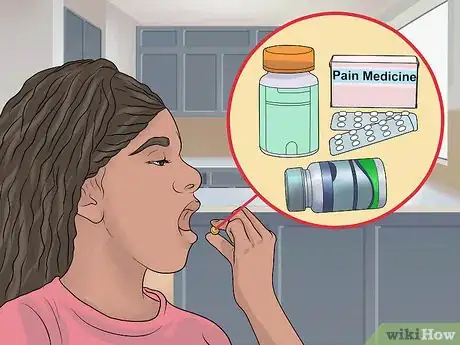

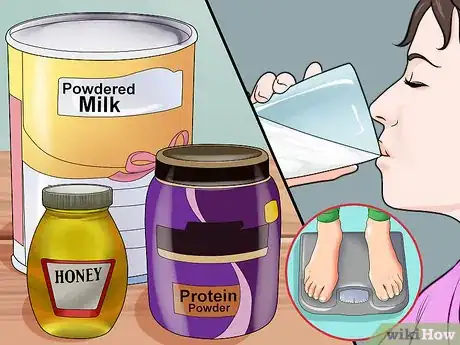

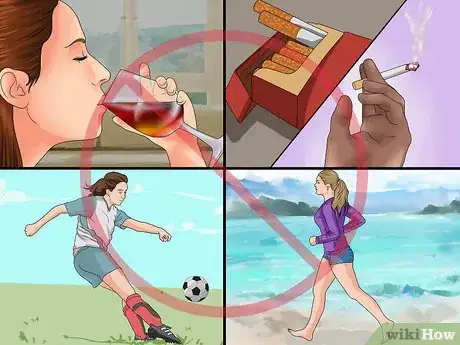

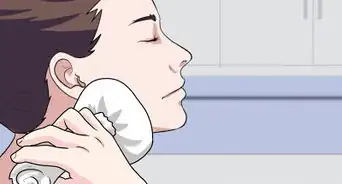
-Step-11.webp)
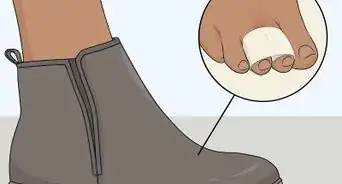



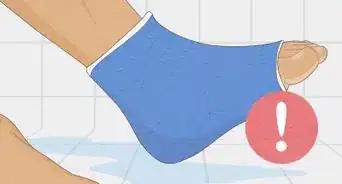
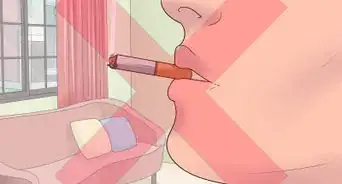
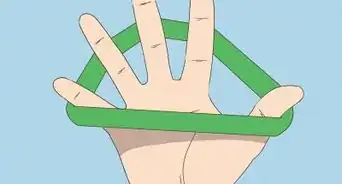
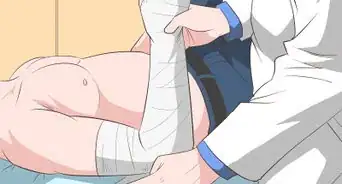
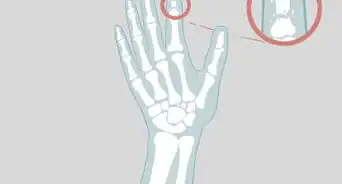











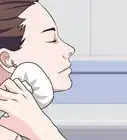
-Step-11.webp)
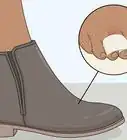




































Medical Disclaimer
The content of this article is not intended to be a substitute for professional medical advice, examination, diagnosis, or treatment. You should always contact your doctor or other qualified healthcare professional before starting, changing, or stopping any kind of health treatment.
Read More...